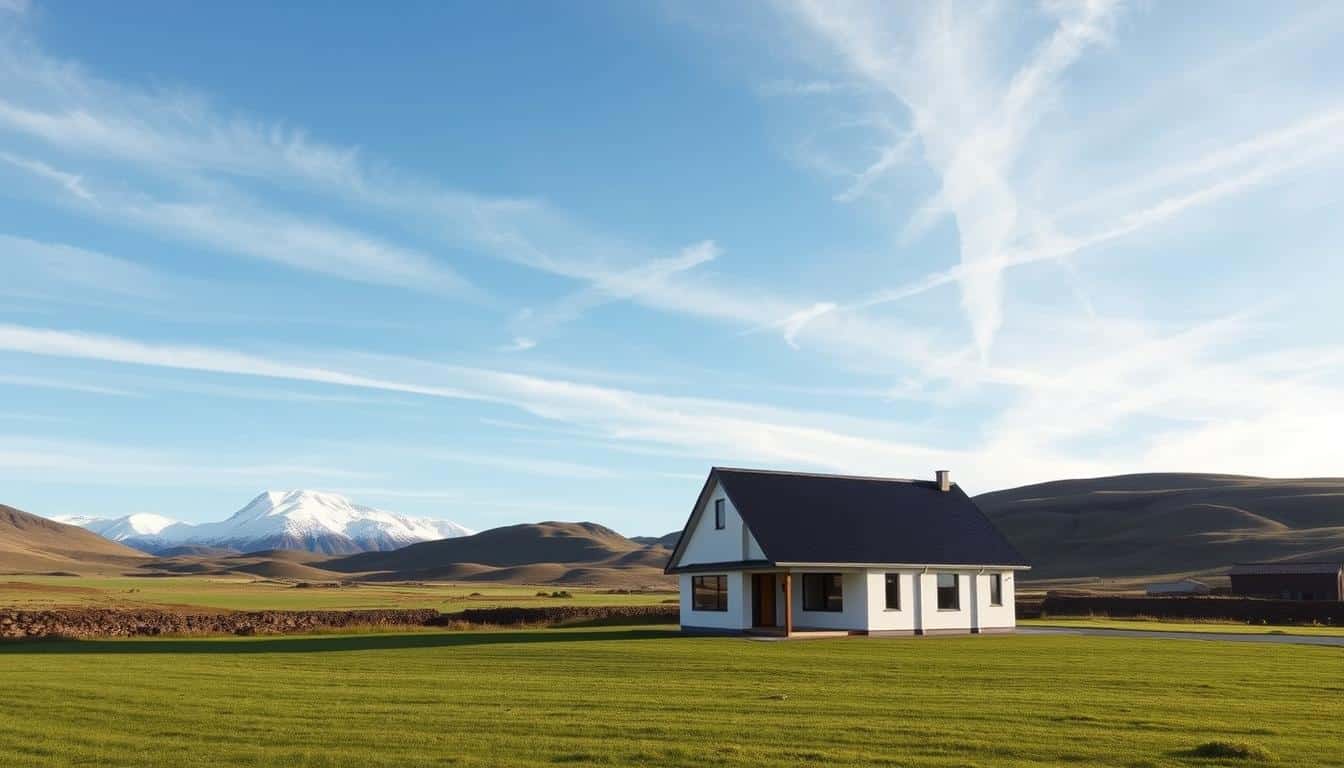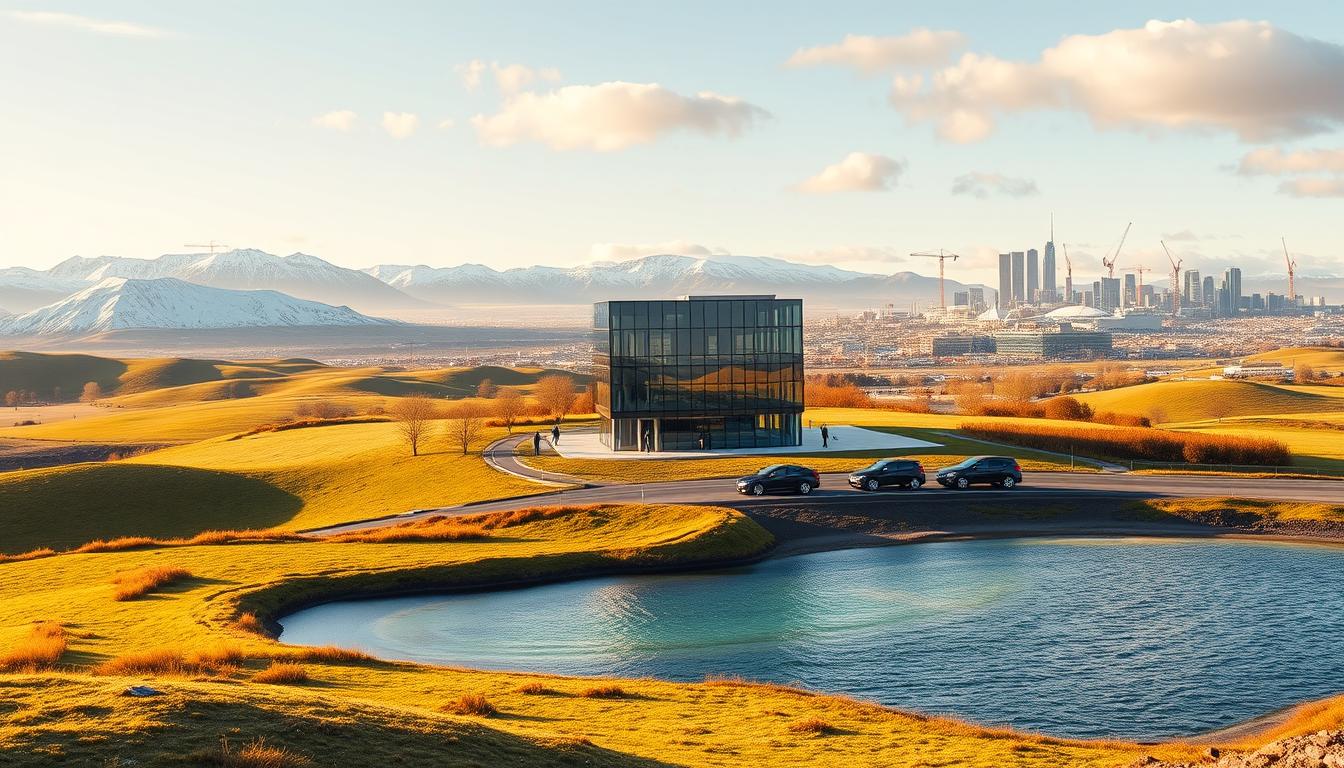Retirees coming to Iceland need to plan well. It’s a place loved for its scenery and culture. But moving here requires knowing some special things.
Financial planning is a big part of getting ready. You’ll need to think about money, visas, living costs, and health care. Doing this helps ensure a smooth move and a comfortable life.
Anúncios
The Allure of Retirement in Iceland
Iceland is a top pick for retirees wanting a special way of life. It has stunning views, a deep history, and a lively feel that mixes modern living with nature. The country is home to the Northern Lights and geothermal spas, inviting retirees to enjoy its natural wonders.
Locals are welcoming to newcomers, making it easier for retirees to settle in. Many Icelanders speak English well, helping to build friendships. This friendly atmosphere makes retirees feel at home and encourages them to join in local community events.
There are lots of cultural events that show off Icelandic traditions through music, art, and festivals. These events are a chance for retirees to dive into the culture and make new friends. For those who love the outdoors, there are activities like hiking and relaxing in hot springs.

Understanding the Cost of Living in Iceland
Iceland is one of the most expensive places in Europe to live, especially in cities like Reykjavik. Retirees need to know how much they’ll spend each month. On average, a retired couple will need about $2,600 each month for things like their home, bills, food, getting around, and eating out.
Average Monthly Expenses for Seniors
Retirees planning to live in Iceland should budget for key expenses. Here’s what they typically include:
- Rent for a one-bedroom apartment in the city center is about $1,100.
- Utilities may cost between $200 and $300.
- Groceries can be around $450 monthly since many food items are imported.
- Eating out could add $300 to $400, based on how often you do it.
Housing and Transportation Costs
Knowing about housing costs helps retirees manage their money better. A small apartment in downtown Reykjavik costs around $1,100. Outside the central area, prices might be a bit lower but are still high.
To save on getting around, retirees can use public transit, which is good and works well in the city. Having a car means paying for insurance, fuel, and upkeep. Choosing public transport helps save money and avoid extra costs.
Visa and Residency Requirements for Retirees
If you’re a retiree thinking about moving to Iceland, it’s crucial to know about visa needs. U.S. citizens can stay without a visa for up to 90 days. For longer stays, they must apply for a residence permit in Iceland, designed for those wanting to live there longer.
Long-Term Residency Permit Process
To get a long-term residency permit, you must show you have enough money. Retirees need about 270,825 ISK ($2,376) each month for living costs. This proof helps make sure applicants won’t need financial help while in Iceland.
Documentation Needed for Application
Getting the right documents is key for a successful application. Important things you’ll need include:
- Proof of having enough money
- Health insurance that works in Iceland
- A place to live
- All application forms filled out
This planning keeps you in line with immigration rules, letting retirees enjoy life in this beautiful place. The application process is detailed, so pay close attention to avoid problems with your stay in Iceland.
The Climate and Lifestyle Differences
Iceland has a unique environment with weather that deeply impacts daily life and fun activities. For retirees, adapting to the climate can make living here better. The country experiences big changes in seasons, so being ready is key, especially in winter.
Adapting to Iceland’s Weather Patterns
Newcomers must get used to Iceland’s cold, especially in winter. The average lows can fall into the 30s Fahrenheit, and it can get as cold as -20 degrees. It’s important to buy good winter clothes for a comfy life. Besides dressing warmly, enjoying the seasons’ beauty makes adjusting to Iceland easier.
Cultural Integration for New Residents
At first, fitting into Iceland’s culture can seem tough. Icelanders have a mix of warmth and privacy. By joining local happenings or groups, one can make friends and feel at home. Learning Icelandic and taking part in cultural exchanges also helps blend into this lively community.
Healthcare Access in Iceland for Retirees
Iceland has a strong healthcare system that benefits its residents, especially retirees. It’s important to understand how healthcare works here, especially for those moving to Iceland for retirement.
Universal Healthcare System Overview
Living in Iceland for at least six months makes you eligible for essential medical services. The government funds this healthcare system, keeping costs low for clinic and hospital visits. However, it’s worth noting that seeing specialists might require more time.
Provisions for Non-Residents
Health insurance is a must for those who just moved to Iceland. This rule helps ensure that newcomers are covered before they can use Iceland’s healthcare system. Until they are fully eligible, retirees should get temporary insurance. Learning about local healthcare facilities makes settling in Iceland easier.
Financial Planning Strategies for Retirement
Making a good financial plan for retirement is key to a comfortable life in Iceland. It means managing your money wisely and looking at different ways to invest. With a proper plan for their money, older adults can afford the lifestyle they want.
Creating a Sustainable Budget
Having a budget that works long-term is critical for smart financial planning. It involves keeping track of all money coming in and going out. This lets retirees spot where they might be spending too much. Important things to watch include:
- Monthly housing costs
- Healthcare expenses
- Transportation and travel
- Leisure activities and hobbies
By understanding these costs, retirees can make a plan that lets their spending support their goals. This forward-thinking reduces money worries and leads to a happier life.
Investment Options Available to Residents
Knowing the investment opportunities in Iceland is key for a bright financial future. People can choose from different investment types that suit their situation. For instance:
- Pension funds with good returns
- Real estate that grows in value over time
- Investing in the stock market, here or abroad through brokers
Working with a financial advisor who knows Icelandic tax rules can also help. This expert advice makes dealing with investments less complicated, securing retirees’ financial well-being.
Retirement Planning: Essential Considerations
As you near retirement in Iceland, it’s key to think about your needs and goals. Understanding these helps you see if your savings match your retirement dreams.
Assessing Basic Needs and Lifestyle Goals
Start by honestly looking at what you spend each day and month. You should think about costs like:
- Housing costs such as rent or mortgage payments
- Healthcare expenses, including insurance and out-of-pocket costs
- Daily living expenses such as food and transportation
- Leisure activities, travels, or hobbies
By doing this, you can figure out your perfect retirement life. This helps make your savings goals more realistic.
Determining Necessary Savings Amount
To know how much you need to save, look at your future needs. Think about things like:
- Your expected monthly expenses during retirement
- Potential healthcare needs as you get older
- How inflation and the economy might impact your savings
- Any big plans for travel or hobbies
Creating a solid financial plan means you’re ready for both the expected and the surprises in retirement.
Exploring Social Support and Community Resources
Creating a social network is key to a better life after retiring in Iceland. Getting involved with local groups and using resources for retirees can create strong friendships and improve emotional health.
Connect with Local Organizations
Retirees in Iceland often join local organizations for social support. These can include service groups or clubs based on hobbies. They are urged to:
- Join expat groups for people new to the area.
- Get involved in social clubs that match their interests.
- Help out in community service to find purpose and friends.
Building a Social Network
Friends in Iceland can be made through local events and gatherings. By going to cultural festivals, language exchanges, or church activities, retirees find meaningful connections. Being active at these events helps them fit into their new community.
Navigating Tax Obligations in Iceland
Understanding tax obligations in Iceland is essential for U.S. retirees. They face the challenge of dealing with two tax systems. This creates complexities in planning for retirement. Learning about international tax treaties helps ease these challenges.
Understanding International Tax Treaties
International tax treaties, like the one between the U.S. and Iceland, help avoid double taxation. They ensure you don’t pay taxes twice on the same money. For those retired in Iceland, it’s crucial for protecting their pensions. A tax expert with knowledge of both systems is a key resource.
Taxation for Retired Residents
Retirees in Iceland deal with different taxes than in the U.S. Becoming a tax resident happens after 183 days in Iceland. This then subjects them to Iceland’s tax laws, sometimes at higher rates than the U.S. It’s important to understand these rates for retirement planning.
Maximizing Your Retirement Savings
Retirees have challenges with their money. Learning how to grow retirement funds is key for a good life. Using different retirement accounts right can really help your money situation. Also, cutting down on spending in retirement can leave more for what you really need.
Utilizing Retirement Accounts
Getting the most from retirement savings begins with smart planning. IRAs and 401(k)s offer tax perks and the chance for your money to grow. Here are important things to think about:
- Contribute to IRAs for tax-deferred growth.
- Take full advantage of employer matches if available.
- Consider Roth accounts for tax-free withdrawals in retirement.
Strategies for Reducing Living Expenses
Along with using retirement accounts well, lowering your expenses can make a big difference. With the right strategies, retirees can live well without worrying about money. A few ways to do this include:
- Reducing discretionary spending on luxury items.
- Utilizing public transportation for cost-efficient travel.
- Prioritizing local food sources to avoid higher import prices.
Planning for Unexpected Costs in Retirement
Managing money in retirement means being ready for surprises. Unexpected costs can pop up, so it’s smart to save ahead. An emergency fund is key for covering sudden bills, like healthcare or home fixes.
Emergency Fund Importance
An emergency fund is like a safety net for your finances. It’s wise to save enough to cover living costs for three to six months. This way, you’re ready for anything unexpected without risking your money plan.
- Medical emergencies
- Home repairs
- Unexpected travel costs
Building a strong emergency fund takes some work and smart planning. But keeping up with regular savings can help you feel secure. This makes sure you’re prepared for any surprises in retirement.
Conclusion
Planning for retirement is key, especially if you’re looking at Iceland. Understanding costs, healthcare, and visa needs helps make moving smoother. This guide emphasizes the need to know about moving to this beautiful Nordic country.
Also, becoming part of the local community adds value to your retirement. It helps you make friends and enjoy Icelandic culture more. By planning your finances and building networks, you’re all set for a great life in Iceland.
With good research and preparation, retirees can do well and enjoy Iceland’s beautiful views. Planning your retirement right helps you have a happy, lasting future.
FAQ
What is the cost of living for retirees in Iceland?
FAQ
What is the cost of living for retirees in Iceland?
A retired couple living in Reykjavik spends about ,600 monthly. This includes rent, utilities, groceries, transportation, and eating out. Renting a one-bedroom apartment in the center costs around
FAQ
What is the cost of living for retirees in Iceland?
A retired couple living in Reykjavik spends about $2,600 monthly. This includes rent, utilities, groceries, transportation, and eating out. Renting a one-bedroom apartment in the center costs around $1,100.
Do I need a visa to retire in Iceland?
U.S. citizens can stay in Iceland for 90 days without a visa. For longer stays, you must get a residency permit. You need to show you can support yourself financially and have health insurance.
How does the healthcare system work in Iceland for retirees?
Iceland offers a universal healthcare system after you’ve lived there for six months. Non-residents need health insurance right away. The government pays for most medical services, and you pay small fees.
What can retirees do to integrate into Icelandic culture?
Retirees can join community activities, learn the Icelandic language, and go to local events. Making friends and taking part in culture helps you adjust better.
Are there specific tax obligations for American retirees in Iceland?
Yes, American retirees must file U.S. tax returns no matter where they live. Spending 183 days in Iceland makes you a tax resident there. You might pay higher taxes than in the U.S.
What financial planning strategies should retirees consider?
Creating a budget, keeping an eye on your money, and investing wisely is key for retirees. Getting advice from a financial expert who knows about Icelandic laws is a good idea too.
How can retirees prepare for unexpected costs during retirement?
Having an emergency fund is vital. It should cover three to six months of expenses. This money helps with sudden costs, like healthcare needs or home repairs.
What are the best ways to reduce living expenses in Iceland?
Living cheaper in Iceland means cutting extra spending, using buses and trains, eating local foods, and getting retirement matches if available.
What lifestyle activities does Iceland offer for retirees?
Retirees can hike, enjoy hot springs, and join community festivals. Iceland’s beauty and culture make retirement enjoyable.
What documentation is required for the residency application?
For residency, you need to show you have enough money, health insurance in Iceland, and a place to live. Make sure all your papers follow Icelandic rules to avoid problems.
,100.
Do I need a visa to retire in Iceland?
U.S. citizens can stay in Iceland for 90 days without a visa. For longer stays, you must get a residency permit. You need to show you can support yourself financially and have health insurance.
How does the healthcare system work in Iceland for retirees?
Iceland offers a universal healthcare system after you’ve lived there for six months. Non-residents need health insurance right away. The government pays for most medical services, and you pay small fees.
What can retirees do to integrate into Icelandic culture?
Retirees can join community activities, learn the Icelandic language, and go to local events. Making friends and taking part in culture helps you adjust better.
Are there specific tax obligations for American retirees in Iceland?
Yes, American retirees must file U.S. tax returns no matter where they live. Spending 183 days in Iceland makes you a tax resident there. You might pay higher taxes than in the U.S.
What financial planning strategies should retirees consider?
Creating a budget, keeping an eye on your money, and investing wisely is key for retirees. Getting advice from a financial expert who knows about Icelandic laws is a good idea too.
How can retirees prepare for unexpected costs during retirement?
Having an emergency fund is vital. It should cover three to six months of expenses. This money helps with sudden costs, like healthcare needs or home repairs.
What are the best ways to reduce living expenses in Iceland?
Living cheaper in Iceland means cutting extra spending, using buses and trains, eating local foods, and getting retirement matches if available.
What lifestyle activities does Iceland offer for retirees?
Retirees can hike, enjoy hot springs, and join community festivals. Iceland’s beauty and culture make retirement enjoyable.
What documentation is required for the residency application?
For residency, you need to show you have enough money, health insurance in Iceland, and a place to live. Make sure all your papers follow Icelandic rules to avoid problems.
Do I need a visa to retire in Iceland?
How does the healthcare system work in Iceland for retirees?
What can retirees do to integrate into Icelandic culture?
Are there specific tax obligations for American retirees in Iceland?
What financial planning strategies should retirees consider?
How can retirees prepare for unexpected costs during retirement?
What are the best ways to reduce living expenses in Iceland?
What lifestyle activities does Iceland offer for retirees?
What documentation is required for the residency application?
Conteúdo criado com auxílio de Inteligência Artificial



